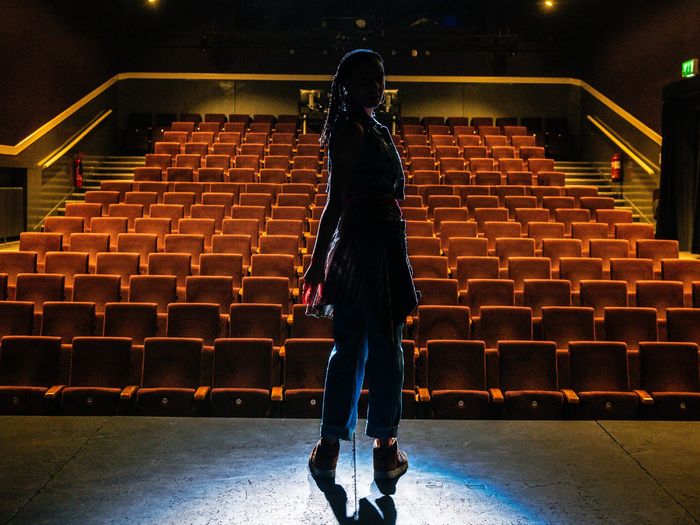Picking up the pieces of One and a Part
Hidden away in the Pembroke New Cellars until 10th February, Toby Collins’ new play One and a Part is working to display the depths of female intergenerational trauma.

One and a Part does not lend itself to an easy summary. The hour-long production is framed around the lifelong shortcomings and tragedies of a nameless Oxford-educated woman (Emily Megoran), later referred to as “Mother”. These begin after she is wronged by her male colleagues (Olivia Newbery and Alice Frecheville) when her name is entirely omitted from an engineering report that she authored. Although Mother’s work is her “Eden” or “Shangri-La”, as the play’s tagline reveals, she now “sells her body, working on her own terms”. Her fall into sex work – a choice motivated by a thought process the audience is not privy to – proves to be anything but liberating. Mother is in a constant, complicated state of pain.
The production’s five person cast (also all playing unnamed roles) are faced with the immense task of conveying the work’s weighty emotional ambitions, and must be commended for their efforts to handle a work that is prefaced by a laundry list of content warnings: references to death, pregnancy, sex, sexism, alcohol, violence, abuse and prostitution (illegal organ harvesting not included).
“A work that is prefaced by a laundry list of content warnings.”
Collins’ narratological approach is artistically fragmentary but chronological; half of the story is described by the narrator (also Mother’s child, played by Enya Crowley) in poetic monologues, while the other half occurs in embodied performances representing the past. This means the audience is often witness to some of Mother’s most vulnerable moments, and while, appropriately, these moments are not fully staged and left to the imagination, the script might benefit from more detailed or authentic attention to the emotional suffering and abuse that it contends with.
Unfortunately, the second half of the story could have done with some better markers of character, as most of the cast played various roles without identifiable differences from their previous roles. This made the setup for certain narrative events confusing, notably those involving the (only alluded to) grandfather and daughter (Rachel Stuart), whose monumental dramatic twist involving her grandmother’s client needed further clarity and attachment to the overarching plot. The production time and time again seemed unable to lead its audience along an undeniably disorientated storyline.
"One and a Part’s cast and crew should also be commended for their performances, which were evidently well-rehearsed and polished.”
Although the script could benefit from fine-tuning, much great work is still on display in One and a Part. One of the most striking elements of the production was the thoughtfulness of the set in tandem with the use of the space. Mother’s entire life is suspended onstage at all times through objects. From her bed to her gravestone, objects bring time into a kind of unity as the cast explores and poeticises the events of her story. The symbolism did not go unnoticed.
“Although the script could benefit from fine-tuning, much great work is still at display in One and a Part.”
One and a Part’s cast and crew should also be commended for their performances, which were evidently well-rehearsed and polished. An opening night wine glass blunder was expertly saved by the narrator’s improvisation, producing a moment of unique theatricality that felt beautiful and intentional, all while giving the subsequent monologue some rewarding suspense. Additionally, the scenes featuring the Mother and her friend (Olivia Newbery) had a particularly notable chemistry that brought an earnest and refreshing balance to some of the play’s more lyrically dense digressions.
Through its poetry, Collins’ play challenges its audience to think about the complexities of tragedy within family life and womanhood more broadly; raising numerous questions about the value of beauty, trauma, and forgiveness.
One and a Part is showing at Pembroke New Cellars from 6th - 10th February 2024.
 News / SU reluctantly registers controversial women’s soc18 December 2025
News / SU reluctantly registers controversial women’s soc18 December 2025 Features / Should I stay or should I go? Cambridge students and alumni reflect on how their memories stay with them15 December 2025
Features / Should I stay or should I go? Cambridge students and alumni reflect on how their memories stay with them15 December 2025 News / Dons warn PM about Vet School closure16 December 2025
News / Dons warn PM about Vet School closure16 December 2025 News / Cambridge study finds students learn better with notes than AI13 December 2025
News / Cambridge study finds students learn better with notes than AI13 December 2025 News / Uni registers controversial new women’s society28 November 2025
News / Uni registers controversial new women’s society28 November 2025










